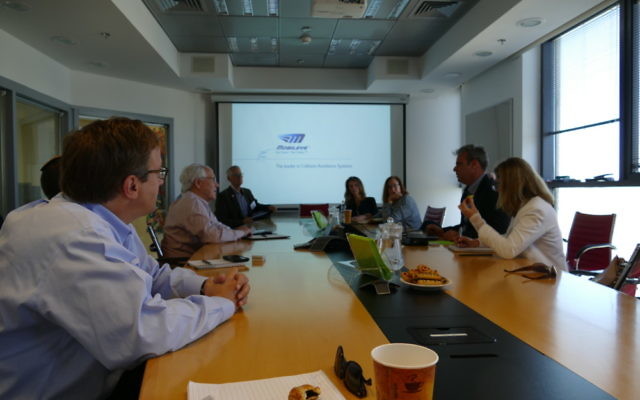Intel-Mobileye Deal Propels Self-Driving Cars
The $15.3 billion purchase is the Conexx Deal of the Year.
In the swift progress toward autonomous vehicles, the merger between Intel and Israeli company Mobileye was a huge step.
“By any measure, the acquisition of Mobileye by Intel is the most notable deal coming out of Israel in the past year. This is the largest acquisition in Israel’s history,” Conexx President Guy Tessler said.
Conexx is honoring that acquisition, valued at $15.3 billion, with its Deal of the Year award at the Conexx Gala on March 22 at the Atlanta History Center.
Mobileye makes sensors and systems to enable a vehicle’s computer to know where it is in relation to its surroundings, a key element of self-driving cars. Its technology is used by more than 25 automakers, and more than 24 million of its systems are on the road.
Mobileye is responsible for any collision avoidance, such as automatic emergency braking, in GM, Ford and BMW vehicles. More advanced highway driving in which the car takes over, such as GM Super Cruise, Nissan ProPILOT Assist and the autopilot system on the Audi A8, also uses Mobileye technology.
“With Mobileye, they get the company that is the leading provider of vehicle technology that is going on the road today,” said Dan Galves, the senior vice president and chief communications officer at Mobileye.
Intel has its eyes on the future, he said.
“Intel is a company that is doing some excellent work in putting in place business plans that will create growth for the long term,” Galves said. “The automobile is changing drastically and becoming much more technology-oriented, and they want to play a role there.”
Partnering with Intel is important for Mobileye as well, Galves said, pointing out that while software and design are important in creating autonomous cars, policy changes and data collection are important next steps to move forward.
“They are more than a product; they are an industry,” Galves said. Intel can accomplish “things that a small company from Israel can’t do on their own.”
Intel’s longtime relationship with Israel definitely affected the deal.
“This was one of the other really positive points in evaluating whether we would like to merge with a bigger player,” Galves said. “It was important that Intel has deep roots in Israel and understands that market and has proven that they are in Israel for the long haul.”
Usually when large company and small companies merge, the large company swallows up the small company, but the Intel-Mobileye deal is different. Mobileye took the lead and brought in Intel, which is keeping Mobileye’s operations in Israel.
“It’s a sign of respect and belief in what Mobileye is doing and the path that we’re on,” Galves said. “We’re proud that a small company from Israel can become really the lead.”
The merger benefited both Mobileye and Intel, he said.
The deal is pushing the world toward the reality of autonomous vehicles. Tessler said he hopes the merger will inspire other companies.
“Conexx chose to honor the deal since we expect it to accelerate innovation for the automotive industry, especially here in the Southeast, and inspire other companies to walk in their footsteps and become technology providers in this fast-growing market of autonomous cars,” he said.
Galves said Mobileye believes the first truly autonomous vehicles will come off assembly lines in 2021 or 2022.
“Autonomous vehicles have the potential to really change the world in many ways,” he said. “A major reduction in traffic accidents and inexpensive, flexible, on-demand transportation for people who are underserved right now — seniors, those with disabilities and lower-income people.”




comments